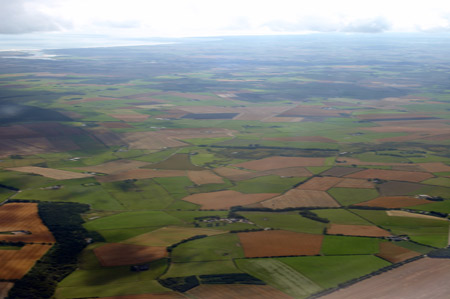A Week After Trump’s Election, The Impact on Agriculture
Category: Policy
 (Agrimoney) – A week after Donald Trump’s election into office, oil prices have risen, gold prices have edged higher and the dollar has strengthened to its highest level in over thirteen years. Bond yields have soared on expectations that Trump’s economic policies will fuel inflation. As his election as president has not had the initial negative effect that many investors feared, we revisit experts to see how they think his election will impact the agricultural sector.
(Agrimoney) – A week after Donald Trump’s election into office, oil prices have risen, gold prices have edged higher and the dollar has strengthened to its highest level in over thirteen years. Bond yields have soared on expectations that Trump’s economic policies will fuel inflation. As his election as president has not had the initial negative effect that many investors feared, we revisit experts to see how they think his election will impact the agricultural sector.
Francois Thaury, director of soft commodities, Agritel:
“Considering 75% of US farmers supported Trump, there are expectations of a lot positive moves towards US agriculture.
“His policies of lower taxes for family farms was welcomed.
“His policy towards illegal immigration could be negative for agriculture, as they comprise a lot of the workers, especially during harvest season.
“Trump spoke a lot on trade agreements during his campaign, however, it remains to be seen what will actually be implemented. China is a huge buyer of US soybeans, and US will want to maintain good relations with it.”
Paul Georgy, chief executive, Allendale:
“The stronger dollar is now pressuring US soybean exports and impacting Brazilian and Argentinian exports as well, as their prices have gone down.
“US exports will become expensive and this year we have large harvests of wheat, corn and soybeans, all of which will be affected.
“The dispute between the Environmental Protection Agency (EPA) and “Waters of the United States” (WOTUS) rule – which defines which streams, rivers, ponds, wetlands, ditches, and waterways are subject to the regulations of the Clean Water Act – will be of particular concern to the agricultural sector.
“A lot of the concerns on trade wars are based on speculation. There is a consensus that there will be difference between what Trump said during the election and what is reality.”
Wandile Sihlobo, head of economic and agribusiness intelligence at South Africa-based Agbiz:
“On the short-term market reaction, the Trump victory led to a little bit of wobbling [weakening] of the South African rand to the US dollar, and that added some gains on agricultural commodity markets.
“A weaker Rand increases the costs of inputs due to the fact that South Africa imports roughly 80% of its annual fertilizer consumption and 95% of agrochemicals. Fertilizer makes up roughly 35% of grain production costs.
“Unfortunately, South Africa is set to be a net importer of grains in 2016-17 due to lower domestic supplies on the back of a recent drought.
“Therefore, a weaker rand does not help much because we can’t sell any large volumes of grains to the world.
“On a long term basis, Trump’s views on trade are a bit concerning. The South African agricultural industry exports roughly 3 bn rand of products per annum to the US.
That said, he hasn’t said much about the African Growth and Opportunity Act or Africa in his recent speeches, so this offers some hope that he might not focus on Africa, but more on mega-regional trade agreements.”
Carsten Fritsch, analyst at Commerzbank:
“The higher dollar will have a negative impact on dollar-denominated crops.
“The latest sharp depreciation of their national currency gives Brazilian producers an incentive to sell any soybeans they have left over.
“Grain prices profited from the increase in the price of oil yesterday. Corn, the most important raw material in ethanol production, was pulled up in particular. This in turn supported the wheat price.
“In response to tariffs, China may think of buying from Latin America or elsewhere. But it cannot rule out US supplies.”
Geordie Wilkes, research analyst at Sucden Financial:
“With all agricultural products barring cocoa denominated in dollars, the [dollar] moves presented significant headwinds to these commodities.
The days after the election we witnessed increased volatility with prices falling as the dollar’s purchasing power increased.
The incoming President is said to favour investment in infrastructure which will primarily boost industrial commodities, we could see agriculture suffer and rely more on private sector funding.
One bright spot on the horizon is the fact that Trump is likely to stand firm against the regulators, pledging to lower the tax rate on family farms to 15% which could provide some short term relief.”




